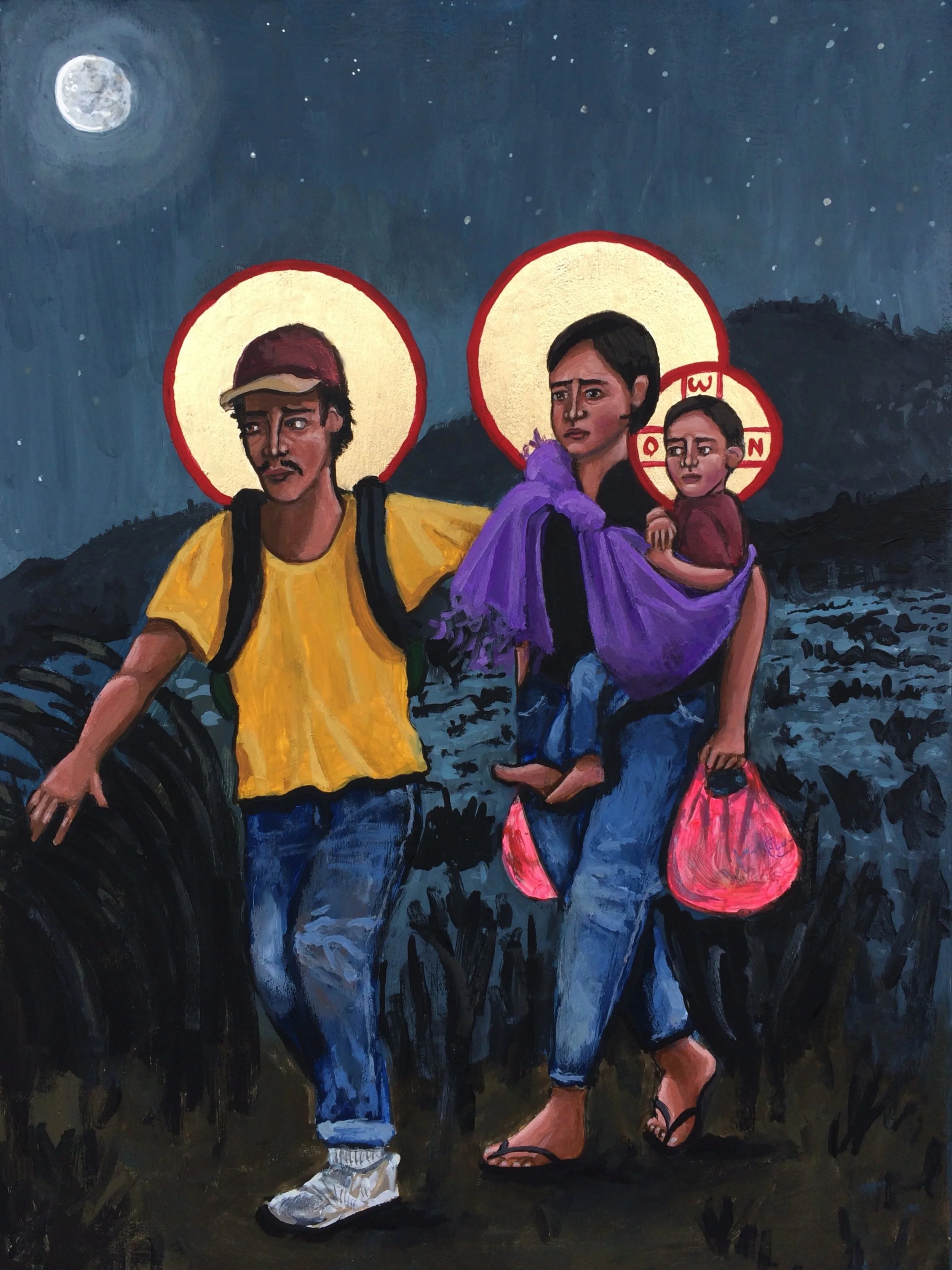January 5, 2025 ☩ The Second Sunday of Christmas
“La Sagrada Familia”
Episcopal iconographer Kelly Latimore expresses images, like “La Sagrada Familia,” that connect The Holy Family and their experience to modern day parlance of migrants. He gives us a visual of how The Holy Family’s experience would be viewed in today’s context. Source
on
Matthew 2:13-15,19-23
“Ponder in Our Hearts: Modern Terms in Ancient Contexts”
In Luke’s Gospel appointed for Christmas, we hear of the shepherds being drawn to the cradle at Mary’s feet. The shepherds, in continued amazement share all they witnessed that led them to the infant Messiah, including the angel that called them and the multitude of heavenly beings that sang God’s praises. Luke’s Gospel concludes the interaction with a powerful message: “Mary treasured all these words and pondered them in her heart.” [Luke 2:19]
There is a powerful internalized focus of change on how we process, digest, and navigate our outward experiences. Mary exemplifies it. Mary had her own experiences of the visitation by Gabriel, Elizabeth’s child John jumped with joy in her womb when pregnant Mary visited her, and now shepherds tell her of these glorious visions that brought them to see the infant. It is amazing, because what could an infant truly offer? They are fragile and delicate and require persistent care. Yet, all these signs pointed to a much greater power within this tiny infant.
For Mary, all these outward events during pregnancy, coupled with the necessity of traveling to Bethlehem, were suddenly internalized. Mary had to decide what to do with these experiences. We, too, have experiences out and about in the world. We, too, need to decide what to do with them. When we ponder these things in our hearts, how does it change us? Do we allow it to settle in so deeply, that our response to the world is forged in the knowledge of God’s love? If we do allow those holy experiences – the little moments of surprise visitors, even strangers like shepherds and wise men; as well as big moments of miracles that we often too easily justify away as a fluke occurrence – then it truly would reshape our hearts, and our minds. As an extension, it would also reshape how we respond to the world, because there is a new version of ‘us’ with which to engage the world.
Today, we observe the Second Sunday of Christmas. Not every year do we have two Sundays in Christmas season which is always fixed between December 25th and January 5th – 12 days long. Christmas season concludes with the Epiphany on January 6th, when we recognize the wise men reaching the infant Christ having been guided by the star.
So, we continue pondering the depth of love in the tangible expression of the Incarnation in the Nativity, or birth, of Jesus Christ. To make this experience more meaningful, we too should ponder all these things in our hearts, not simply as a story, but as an account of what truly had happened. While we ponder these things, we should also hear these accounts, like today’s Gospel reading in Matthew which follows the Epiphany Gospel, though we hear it a day early, in a way that uses modern language.
We must embrace who Joseph, Mary, and Jesus were in today’s parlance (language). First, rich migrants from another country traveled to find a baby in whom hope was born. These were the wise men. Migrants, and immigrants, in our modern American culture has mixed reflexive responses based on various cultural emphasis, particularly in politics. Politics aside, these wealthy individuals had the means to travel and did so probably with ease. They still showed generosity at the foot of the cradle.
Similarly, Joseph, Mary, and Jesus were migrants. They traveled to Bethlehem for the birth of Jesus, still in their own country. Yet, with suspicions and knowing their political landscape, they became ‘immigrants’ when fleeing to Egypt for safety. There is a bit of irony here. Their destination of safety was the same land which their ancestors were enslaved. Still, our holy family immigrated to Egypt and became ‘migrants’ when they returned to Israel. Still, mindful of another challenging political landscape, Joseph hesitated to take his family to Judea and, instead, settled in Nazareth.
For the holy family, this was a stressful period of survival. Scripture does not tell us the whole of Israel fled to Egypt, because oppression usually succeeds when only particular groups are targeted. We can ponder this account of our faith to understand that Mary, Joseph, and Jesus we among the more deeply oppressed as children of Jesus’ age were feared by political and religious leaders. Imagine the stress that weighed upon a young family to survive. Imagine how difficult is must have been to walk to another country, have to learn a new language, understand new customs, find new sources of food and places to live. Imagine how marginalized they must have been. Simply looking at their family life can give us personal connections to how they must have felt.
Effectively, in their travels to and from Egypt, this family becomes termed as “migrants” in today’s language. Each of us probably have different internalized responses about migrants and immigrants in our American society. I’m not here to say what we should ultimately think about those in our communities who might fit these terms, but I do hope we ponder deeply that Jesus Christ, our Messiah, ultimately was a migrant. He was raised in a foreign country as a child, being raised bilingual, and impacted by the cultural customs of the region. Jesus likely ended up with an odd Hebrew accent that identified him as ‘different’ or ‘with suspicion’ when his family did return to Israel. Does considering this fact change what we feel or think about ‘migrants’ or ‘multi-lingual individuals’ in our community? We may only know if we, like Mary, treasure all we hear and ponder these words deeply in our hearts.
